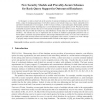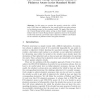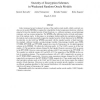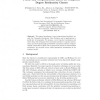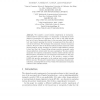IJNSEC
2006
14 years 2 months ago
2006
It has always been a critical issue to find efficient methods for fast revocation of a user's identity in identity (ID)based cryptosystems. Unfortunately, none of the previou...
DBSEC
2007
14 years 4 months ago
2007
In this paper, we take a closer look at the security of outsourced databases (aka Database-as-the-Service or DAS), a topic of emerging importance. DAS allows users to store sensit...
EUROCRYPT
2008
Springer
14 years 4 months ago
2008
Springer
Standard security notions for encryption schemes do not guarantee any security if the encrypted messages depend on the secret key. Yet it is exactly the stronger notion of security...
ASIACRYPT
2008
Springer
14 years 4 months ago
2008
Springer
Encryption schemes that support computation on encrypted data are useful in constructing efficient and intuitively simple cryptographic protocols. However, the approach was previo...
EUROCRYPT
2006
Springer
14 years 6 months ago
2006
Springer
In this paper we examine the security criteria for a KEM and a DEM that are sufficient for the overall hybrid encryption scheme to be plaintext-aware in the standard model. We appl...
CRYPTO
2007
Springer
14 years 6 months ago
2007
Springer
We present as-strong-as-possible definitions of privacy, and constructions achieving them, for public-key encryption schemes where the encryption algorithm is deterministic. We ob...
PKC
2010
Springer
14 years 6 months ago
2010
Springer
Liskov proposed several weakened versions of the random oracle model, called weakened random oracle models (WROMs), to capture the vulnerability of ideal compression functions, wh...
EUROCRYPT
1999
Springer
14 years 7 months ago
1999
Springer
Abstract. This paper investigates a novel computational problem, namely the Composite Residuosity Class Problem, and its applications to public-key cryptography. We propose a new t...
ASIACRYPT
2001
Springer
14 years 7 months ago
2001
Springer
We consider a novel security requirement of encryption schemes that we call “key-privacy” or “anonymity”. It asks that an eavesdropper in possession of a ciphertext not be ...
CTRSA
2003
Springer
14 years 8 months ago
2003
Springer
Exposure of secret keys seems to be inevitable, and may in practice represent the most likely point of failure in a cryptographic system. Recently, the notion of intrusion-resilien...

